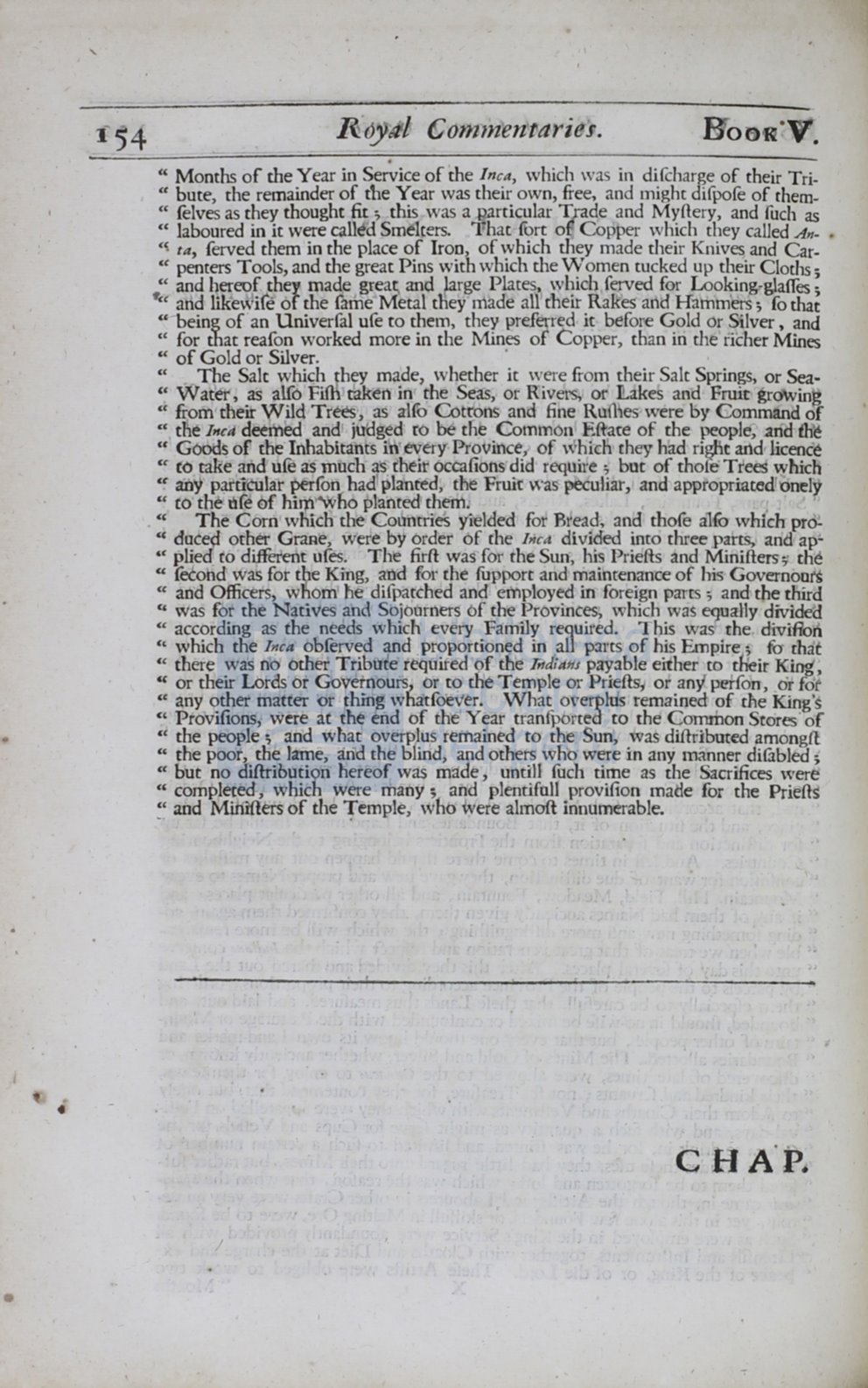

•
Royal
Com1nentaries.
•
"Months of the Year
in
Service of the
Inca,
which\ a in difcharge of their Tri–
" bute, the remainder of the Year was their
own,
free, and might difpofe
of them..
" felves as they thought
fit;
this was a -Wlrticular Trade and Myfiery, and fuch as
'' laboured
in
it
were
called
Smelters.
hat fort of Copper which they called
An-
_
'~
ta,
ferved them in the place of Iron, of which they made their Knives and Car-
" penters
Tools,
and
the great
Pins
with
which
the Women tucked up their
Cloths;
cc
and hereof they made
great
and Jarge
Plates,
w~ch
fe.rved for
LOokiog-glaifos;
cc
and like" ife of the fltme Metal tliey made all their Rakes and Hammers ;
fo
that
"Deing
of
an Univerfal ufe
to
chem, they preferred
it
before Gold or Silver , and
" for that
reafon
worked more
in
the Mines of Copper, than in the richer Mines
" of
Gold or Silver.
"
The Sale
whi~h
they
made~
whether
it \:
ere from their Salt Springs, or Sea–
'' Water, as
alfo Fill\
taken
in
the
Seas,
or Rivers,
or
l!A.kes and Fruit
growing
'' :from their Wild
Trees,
as
aifo C:Otrons
and fine Rufhes were
by
Command
of
cc
the
Inca
deemed and judged ro
be
the
Common
Eftate of che people, and
th~
'' Goods
of the Inhabitants in
every
Province, of whic& they had
rigllt
and
licenc~
" to
take and
ufe
as
much
as their
occafions
did require ;
but
of thole Trees which
<c
any
parucular
perfon
had' planted, the
Fruit
was
~liar,
and appropriaoodronely
«
to
the
uCe
0f
hl!P
ho
planted
them.
"
The
Corn which the Co ntries yielded for Bread, and thofe
alfo
which
pro–
"
dace~
other
Graae, were
by
order
of
the
Inca
divided
into
three
par~
and
ap–
,, plied co different ufes.
The .
firfi
was for the
Sun,
his Priefts
and
Minifters:;
die
" recond
w~
for
the King, and for rhe fupporc
and
maintenance of
his
Govemoors
" and
Officers,
wnom
e difparched and employed
in
foreign parts ; and the third
ci
was for the
Natives and
Sojourners of the Provinces, hich was
equcrlly
divided
'' according as
the
needs which every Family reguired. This was the
diviBon
'' which the
Inca
obferved and proportioned
in
all
par
ts
of
his
Empire ;
fo
that
" there was no
other
Tribute required of the
Tndiat1.s
payable either
to
their
King',
'' or
their Lords or Governours, or to
the
Temple
or
Prie~
or
any
perfon,
or
fot
" any other
matter or
thing wharfoever. What o
erplds
remained of die
King~s
c'
Provifions, were at the end of the Year
tranfj:>orted
to the Common Stores·of
<c
the people; and what overplus remained to the oo, as diftr"bmed amongll
" the poot, the Jame,
ancl
the blind, and others who were in any manner
dHabled ;
" but
no
difiributi9n hereof was made , unti:ll
fuch
time as the
racrifices
were
cc
completed, which were many ; and plentifoll provifion made for the Priefis
~~
and
Mililfiers
of the Temple,
who
were almoft innumerable.
I














